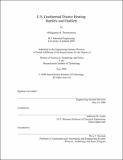U.S. geothermal district heating : barriers and enablers
Author(s)
Thorsteinsson, Hildigunnur H
DownloadFull printable version (2.510Mb)
Alternative title
United States geothermal district heating : barriers and enablers
Other Contributors
Massachusetts Institute of Technology. Technology and Policy Program.
Advisor
Jefferson W. Tester.
Terms of use
Metadata
Show full item recordAbstract
Geothermal district heating experience in the U.S. is reviewed and evaluated to explore the potential impact of utilizing this frequently undervalued renewable energy resource for space and hot water heating. Although the first U.S. geothermal district heating system (GDHS) was constructed in the 1890s in Boise, Idaho, growth in the sector has been slow. Currently there are only twenty-one operating GDHS in the U.S. with a capacity of about 100 MW thermal. In this study the main barriers and enablers to the growth of district heating were identified and investigated. Initially a literature review and interviews with current U.S. district heating operators were used to collect data on various aspects of the systems and their development. Based on analysis of the data and the current structure of the geothermal district heating regulatory and market environment in the U.S. recommendations on how to advance geothermal district heating in the U.S. are developed. Technical feasibility of increasing the geothermal district heating capacity to 10,000 MWt was established by identifying the available resource and technology for utilization. Furthermore, the opportunity presented by Engineered Geothermal System (EGS) was briefly explored. Social feasibility was analyzed and the need for geothermal energy education and expanded resource exploration was recognized. Furthermore, it is hypothesized that most government support for GDHS will come from state governments in the future and the importance of well structured incentives that support the growth of sustainable GDHS emphasized. Legal and regulatory barriers were reviewed along with the economic feasibility of GDHS. The economic analysis revealed competitive levelized energy costs and that rising drilling costs might be a barrier to GDHS development. A modest investment of about five billion dollars is needed to increase U.S. GDHS capacity to 10,000 MW thermal.
Description
Thesis (S.M.)--Massachusetts Institute of Technology, Engineering Systems Division, Technology and Policy Program, 2008. This electronic version was submitted by the student author. The certified thesis is available in the Institute Archives and Special Collections. Includes bibliographical references (p. 122-128).
Date issued
2008Department
Massachusetts Institute of Technology. Engineering Systems Division; Technology and Policy ProgramPublisher
Massachusetts Institute of Technology
Keywords
Technology and Policy Program.